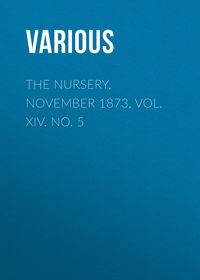Kitabı oku: «The Nursery, November 1873, Vol. XIV. No. 5», sayfa 5
"And just so we ought to treat words. We must first sort them, so as to learn what their use is in speech, and how and where they ought to be used. Grammar teaches us to sort words. Now run and play."
Uncle Charles.
THE BROTHERS THAT DID NOT QUARREL
Two little brothers, loving fair weather,
Played on the meadow, played there together;
Yet not quite lonely were they that day
On the bright meadow, while at their play.
Six little swallows came and flew round,
Over the tree-tops, over the ground;
Butterflies, also, did not disdain
Near them to flutter, glad to remain.
There on the herbage tender and green
Might these two brothers, playful be seen:
Never they quarrelled; no angry words,
Hastily uttered, shocked the dear birds.
All through the daytime there the two played,
Sometimes in sunshine, sometimes in shade.
"And did not quarrel? Please stop your shams!"
"I tell you truly. Why, they were lambs!"
Ida Fay.
GRANDPA AND THE MOUSE
Grandpa Crane went into the city every morning. He had to go so far, and it was so late when he came home to dinner, he thought he would like to have something to eat while he was away.
So every day, when he was ready to go to the cars, Aunt Emmie gave him a little basket with a pretty round cover on it.
Inside she put cookies or gingerbread, or plum-cake with ever so many plums in it. Grandpa liked the plum-cake best of all the little basket carried.
The office he sat in was down on a wharf, where the water comes, and the wind blows, just as if it were out at sea.
When he had been there a long while, he would get his basket, and eat what Aunt Emmie had put in it. As he was old, his hand would shake, and let bits of cake fall on the floor.
Now, a little gray mouse lived in a hole in that very floor, way up in a corner. His bright eyes peeped out at Grandpa Crane when he was eating; and he looked as though he would like to get those good bits if he could muster courage to do it.
One day mousie was so hungry, that he made bold to run at a crumb which had fallen a good way from grandpa's feet. He picked it up as quick as he could, and scampered back with it to his safe little hole.
Finding that grandpa did him no hurt, mousie tried it another day. After a while, he came out every time he saw grandpa open the little basket, and picked up all the crumbs that fell down.
One day grandpa was very tired, and fell fast asleep after he had eaten his cake. Pretty soon he felt a pull at his soft white hair. He put up his hand, and down ran mousie.
Not getting as much to eat that day as he wanted, mousie had just walked up grandpa's side to his shoulder, and then up on his head. Wasn't that a queer place for a mouse to try to find something to eat?
Aunt Emmie.
HOME FROM THE WOODS
It rains! and, hark! the rushing wind
Begins to moan and blow:
Take jug and basket, and come on.
For we have far to go.
Don't fret and whimper, little one;
Here, my umbrella take:
The birds heed not the pouring rain;
Just hear the songs they make!
And see how glad are leaf and bud
To get each cooling drop:
Come, soon it will be bright again,
For soon the rain will stop.
From the German.
THE SPECKLED HEN
The speckled hen walked all around the house, and saw the front-door open. So she walked right in, and went up stairs.
She peeped into the front-chamber, pecked a little at the carpet, and clucked with surprise when she saw herself in the looking-glass.
By and by she saw a wash-bowl standing on the top of the bureau. She thought this would make a nice place for a nest. So she flew up to see; but the bowl tipped over, and fell upon the floor.
When the people came up stairs to see what was the matter, they found that the wash-bowl was all broken in pieces, and the hen had made her nest in the band-box in the corner of the room.
They thought this a very saucy thing for a hen to do; but they did not drive her out: they waited to see what she would do next.
By and by the hen came off, and flew up on the window-sill. Then she began to cackle very loud. I suppose she meant to say, "Go and look in the band-box."
W. O. C.
